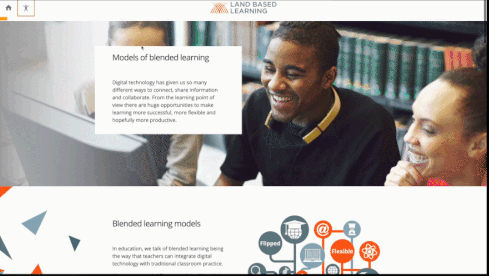
The 6 Benefits of Blended Learning
Do you need convincing of the benefits of a blended learning approach? First Media share six reasons why your organisation should be considering it.
Blended learning might have been around for a while, but many organisations haven’t adopted the approach for delivering training to learners, employees or customers. One reason why this might be is because they aren’t fully aware of its benefits when it comes to compliance training, inductions or even qualifications that would traditionally be taught in a classroom.
First Media think that blended learning is the sweet spot between digital learning and in-person teaching and it’s also totally in line with Ofsted’s ‘3 Is’ of Intent, Implementation and Impact. In this article, we will share what we believe are the six main benefits of blended learning. And by the time you’ve read it, perhaps you’ll be ready to speak to someone (like us) about developing your own blended learning strategy?
1. It’s more flexible to the end user
Training used to take place at a certain time and place. But now, everything is different thanks to advancements in technology. Learners who are participating in blended learning training are more able to fit the learning around their own lives. They control the pace they learn at, when they do it and where they do it from. If you’re an organisation who puts people first, wouldn’t you want to be able to deliver training this way?
2. It's more cost effective
Adopting a blended learning approach can have a positive effect on an organisation’s the bottom line. Just think, if you’re not delivering face-to-face anymore, there are so many associated costs you wouldn’t need to worry about. Things like travel, accommodation and printed materials would be a thing of the past. Yes, there would be a cost for the development of online content and software, but you would quickly start to see a far better return on investment.
3. It provides better all-round understanding
It’s widely believed that a blended learning approach is better at making sure learners understand the subject matter because this way the learning material can be so much more engaging. The mix of videos, scenarios and gamification in the eLearning, combined with the engaging in-person delivery (either via webinars or in a classroom) help to bring the course material to life… and that results in students enjoying the learning process and getting far more out of the training.
4. The learning can be even more personalised
Ask any trainer and they would say that one of the biggest challenges in classroom delivery is being able to support he needs of each of their students. It’s a fact that every learner is different and so too is the amount of help each one requires. The blended learning approach allows teachers to divide students into groups based on their ability and provide them with material that’s designed specifically for them.
5. Embraces new technology and learning in smaller groups
Blended learning isn’t just the mixture of classroom and home learning. It can also be a trainer splitting a class into five or six groups and then working together on a project using digital learning such as a computer, tablet or even virtual reality headsets before the class re-joins for a shorter session with the teacher. Splitting off into smaller groups can also provide an opportunity for some learners to get more support from a trainer if they need it.
6. Improved feedback from learners
With online learning modules, a trainer can get a better picture of where the knowledge gaps are with each learner by analysing the reports available in their LMS. As long as your content has been designed to measure the individual’s progress throughout the course, this information can be available almost instantly. Then it’s possible to find alternative ways of getting the learning material across to make sure the information is getting through.
Get in touch
Are you keen to find out how your business or organisation could start benefiting from adopting a blended learning approach? Contact us for an informal discussion by calling 01507 607783 or emailing [email protected].
Blended learning in action
We recently worked with the agricultural training experts Landex to develop an innovative way of delivering Level 2 and 3 training courses using a blended learning approach.
They required 17 eLearning modules creating on topics associated to horticulture and veterinary medicine and our main challenge was finding ways to bringing the subject areas to life so it would both appeal to, and stretch, an audience of young people.
The engaging training modules have been used in the classroom and for flexible remote learning. For more information, watch this video about the project.


